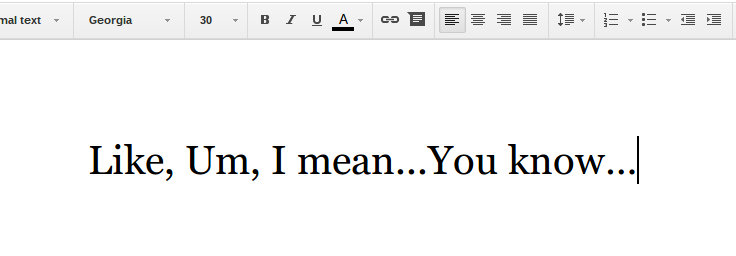
This spring, a group of researchers at the University of Texas at Austin published a fascinating article about filler words. Brilliantly titled “Um… Who Like Says You Know: Filler Word Use as a Function of Age, Gender, and Personality,” the article examines the use of filler words like “I mean,” “you know,” “like,” “uh,” and “um” in oral communications, and what they might say about the speaker. To record this they use a device called an EAR (Electronically Activated Recorder), which I can only assume must be one hilarious researcher joke.
Their findings are even more entertaining, though. They conclude that “Discourse markers, however, were more common among women, younger participants, and more conscientious people.” That’s right, thoughtful people are more likely to say “um, you know” than normal dummies. I’m not sure how these researchers determine what makes someone more conscientious, and I’m a little afraid to investigate, so let’s move on. I’m also not sure why this article doesn’t just conclude that young women are more conscientious than the rest of us; I would have no problem if they did just that. But I will consider this article as a minor victory for the inarticulate, who think more even as they stumble in speech.
The main thrust of the article isn’t just about conscientiousness and speech patterns. Somewhat obviously, the researchers conclude that filler words can be “considered a potential social and personality marker.” And if there’s one thing we love about language, it’s its potential for social and personality marking! This research provides the opportunity for hot new illocutionary content for words that we normally think of as, well, filler. So I’m going to speculate as to what exactly these words might mark. If this were a Cosmo quiz, it would be called WHAT DOES YOUR FILLER WORD SAY ABOUT YOU?
“I mean…”
This one is for those of you in love with meta-commentary. You cannot avoid a reflexive posture to your own speech, and must narrate your own dialogue. “I mean” acts as a reassurance of intent, both to others and to yourself.
But isn’t there always an unspoken “I mean” before anything you say? Before every argument, every sentence, every word? You simply draw attention to your own attempt to communicate meaning. Props to you for speaking the unspoken, for meaning what you say, and saying that you mean.
“Ummm…”
Meditative types, this one is for you. The most common filler word is perhaps also the most abstract. What does it mean; what do you mean? Exactly. The “umm” is the onomatopoeia for thinking of what to say, how to best express oneself. We all know this to be true, but why? There may be a crypto-religious explanation; “ummm” can also sound suspiciously like “Om,” the Sanskrit sound often used in Hindu prayer and meditation. And like “Om,” “ummm” might very well stand outside language, or as a surrogate for language; it is up for debate whether “ummm” is a word at all. There is a meditation that explains the Om thus:
The sound produced in the flowing Ganga, the sound that is heard at a distance and that which proceeds from the bustle of a market, the sound that is produced when the fly wheel of an engine is set in motion, the sound that is caused when it rains, the sound that is produced when there is a conflagration of fire, when there is thunder, it is all Om only. You split any word, you find Om is there.
I’m not saying that this prayer also applies to “ummm,” but I’m not saying it doesn’t. “Ummm”-sayers may know something the rest of us don’t.
“You know…”
For the inner mystic in all of us. The repetition of “you know” as filler suggests some unspoken knowledge between and behind language. At its heart “you know” is the opposite of “I mean;” while “I mean” is practical, reinforcing communication, “you know” acknowledges that communication is impossible, or, rather, that all has already been communicated. It also inspires in listeners the question: Do I know? What do I know? But don’t get it twisted; this filler phrase is not supposed to create a crisis in either speaker or audience. Like all of these examples, “you know” is the invocation of a process, one which both questions and answers the state of knowing in the conversation. You know?
As with all mystical phrases, “you know” is at its heart empowering.
“Like…”
This filler word has the worst reputation of the lot, mostly because of its association with a particular kind of seemingly ditzy young woman. But if Cher from Clueless tells us anything, it is that apparent inarticulateness can hide true wisdom or cunning within. A word like “like” can provide you, like Cher, with the cultural ethos that allows to take the time to perform considered speech.
Moreover, the use of “like” suggests a proclivity for abstraction. All the world is symbolic rather than particular; everything is “like” something. The “like”-sayer is an intensely relational person; she is interested not in objects in the world, but in the matrices of meaning that connect and organize these objects. Just, like, feel the searching out of relative concepts. You might think that the approximation of “like” might lead to relativism; this is untrue. The “like”-sayer simply understands that all knowledge is situational, all language approximate. Searching for the proper word, phrase, or concept is, like, the best we can do to express the particular with the general. There is the world, and there is speech; what word can better, more accurately bring these together than “like”? Pope Francis recently said that “truth is a relationship”; with this he implied his favorite filler word.

